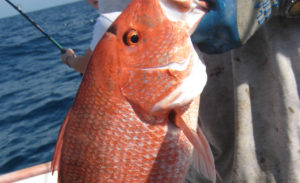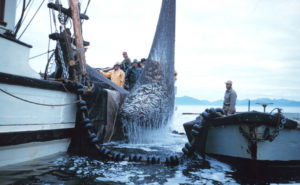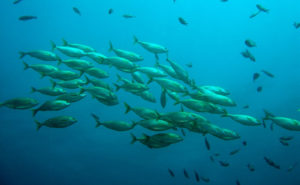A new marine fisheries policy was approved by the AFS Governing Board Atlantic City in August to inform the proposed Congressional re-authorization and amendment of the Magnuson-Stevens Fisheries Management Act, the federal law that governs fisheries management in offshore waters. A special committee of prominent marine fisheries experts led by co-chairs, Tom Miller, University of Maryland Fisheries Professor and Director of the Chesapeake Biological Laboratory and Cynthia Jones, Immediate Past President of the Marine Fisheries Section and Professor at Old Dominion University, developed science-based recommendations to inform policy-makers as they seek to revise the law. The committee focused its advice on four key areas: Best Scientific Information Available, Catch Limits and Rebuilding, Habitat and Ecosystems, and Adapting to Environmental Change. See the summary below or download PDFs of the summary and the full report.

American Fisheries Society Scientific Recommendations
on Reauthorization of the Magnuson-Stevens Act
 Best Scientific Information Available
Best Scientific Information Available
- The American Fisheries Society (AFS) strongly endorses continued reliance on Best Scientific Information Available Standard (BSIA), as a best practice in managing the nation’s fisheries.
More
The success of MSA is based in part of reliance on BSIA in fisheries management. National Standard 2 specifies that “conservation and management measures shall be based upon the best scientific information available.” Under this standard, data must adhere to widely recognized scientific principles to be used in management decisions. AFS views four components of BSIA to be particularly important: (1) all data used in assessments must be collected objectively, (2) data must have a clear statistical foundation, (3) be peer-reviewed, and (4) timely.
- AFS is concerned that data from self-reported sources (i.e. mobile technologies) are not sufficiently reliable to estimate catch without a valid sampling frame and should not be mandated in legislation.
More
Stakeholder collected data reported via mobile technologies seems ideally suited to efficiently collect large volumes of data over large areas. However, without a saltwater angler registry, the data lacks a sampling frame. The use of this data would introduce substantial bias into the management process.
- AFS supports the inclusion of citizen science into fisheries management and encourages the development of innovative survey sampling methods to enable collection of reliable and unbiased data from anglers.
More
New technologies could improve timeliness and accuracy of data and eventually reduce costs, but implementation is complex and costly. Additional funding is needed to innovate and develop new data collection, analysis, and management approaches to enable the collection of reliable and unbiased data from recreational anglers. Involvement of stakeholders in setting objectives for management strategy evaluations provides an opportunity for increased involvement in fisheries management.
 Catch Limits
Catch Limits
- AFS believes science-based management is the cornerstone of fisheries management and recommends the continued separation of scientific and socioeconomic decision-making. AFS supports the requirement that the Acceptable Biological Catch (ABC) must be less than the Overfishing Limit (OFL).
More
AFS believes science-based management is the cornerstone of fisheries management and recommends the separation of scientific and socioeconomic decision-making that has contributed to declines in overfishing be maintained. The Overfishing Limit-Acceptable Biological Catch-Annual Catch Limit framework prevents overfishing while accounting for both scientific and management uncertainty. The requirement that the ABC must be less than the OFL must be maintained. However, revisions to the MSA should allow for adaptable and responsive management to account for new developments in science and management.
- AFS supports maintaining the Annual Catch Limit (ACL) requirement for recreational fisheries, but recommends a flexible approach to defining “Optimal Yield” in individual fisheries.
More
The MSA requires annual catch limits (ACLs) that prevent overfishing for all federally-managed fish stocks. Commercial and recreational fishers harvest fish from the same population. Recreational fishing can have a significant impact on abundance from catch and discards. Therefore, exempting recreational fisheries from the catch limit requirement carries a risk of degrading fisheries. AFS encourages the full exploration and pilot testing of alternative approaches to managing recreational fishing. Direct measure of exploitation rates through methods such as mark/recapture studies could be used to effectively estimate fishing mortality rather than using landings data to estimate biomass. If effective, alternatives approaches such as these can likely be implemented without the need to exempt recreational fisheries from ACLs. A single definition of “Optimal Yield” based on catch in biomass promotes maximum harvest of pounds of fish, which is well-suited for commercial fisheries, but doesn’t always meet the needs of recreational anglers. Concerns over profit or total weight drive commercial fishers while the opportunity to catch fish with the chance that some will likely be large motivates recreational anglers. Councils should have the flexibility to define “Optimal Yield” based on the competing needs of stakeholders in different areas of the country to better balance the needs of individual fisheries.
- Revisions to the Magnuson-Stevens Act (MSA) should allow for adaptable and responsive management to account for new developments in science and management.
- AFS supports increased flexibility in MSA with regard to setting OFLs, ABCs, and ACLs for data-poor stocks.
More
A conventional stock assessment is a data-driven and model-intensive scientific tool to estimate population abundance, fishing mortality, and stock status using information on catch and discards, abundance data collected by state and federal agencies, and biological data on a species. However, more than half of all stocks are considered data-poor. It is very difficult for scientists to determine productivity and set ACLs with any precision with limited catch data or insufficient biological information. AFS supports continued research into alternative approaches that would allow for management using well-known fisheries indicators, spatial controls, and habitat-based approaches to design reasonable and precautionary fishing rates to rebuild stocks without the need to rely on a formal stock assessment.
- AFS urges innovative approaches to managing mixed-stock fisheries and encourages exploration of emerging technology to better manage for “choke” species.
More
Mixed-stock fisheries are ones that catch and land several stocks of fish using the same gear types in the same general areas. Managing for the least productive stock, i.e., “choke” species, restricts fishing for more robust species that would be caught at the same time when the limit for the rare or less healthy stock is reached.
New technologies provide an opportunity to address this challenge by integrating physical data with information on the distributions and preferences of marine species to predict key habitats or productive fishing grounds. Remote sensing and satellite telemetry data can help fishermen avoid non-target or ESA species and can be used to rapidly open and close areas to minimize bycatch. International policy can also help inform future revisions to the MSA. The EU recently banned discarding and requires fishermen to land their entire catch. This allows for more certainty in regards to total catch and provides an incentive to find market-based approaches to yield an economic return on fish that would have otherwise been discarded.
 Rebuilding
Rebuilding
- Rebuilding timelines should be based on the biology of the stock and AFS supports adaptability and flexibility in transitioning into and out of a period of overfishing or rebuilding.
More
The requirement to establish rebuilding plans has been an important tool in achieving healthier and more sustainable stocks. Under current law, rebuilding plans force the abundance of individual species to return to a healthy level in a relatively short time, generally 10 years, with some exceptions. Uncertainty in stock projections coupled with the requirement to rebuild in a defined time frame, such as a ten-year rule, can lead to sharp decreases in catch limits when rebuilding is slower than expected and bring undesirable social and economic impacts. The challenges to managing fisheries in a 10-year timeframe will become more pronounced with changes in environmental conditions, natural cycles, and predator-prey relationships brought on by climate change. AFS cautions that flexibility should not lead to delaying action or ignoring scientific advice. Further, when a stock assessment suggests that a stock cannot rebuild in 10 years, increased harvest pressure and additional annual catch should not be allowed as it is incompatible with rebuilding in as short a time as possible.
- AFS supports the call of the National Research Council to focus on management of exploitation rates in a rebuilding context rather than abundance (biomass).
More
Exploitation rates (fishing mortality) can be estimated more reliably and can be related to the productivity of a particular stock. A slower pace of rebuilding with a constant level of fishing mortality below MSY may be less disruptive and more stable for fishermen than a system that uses increasingly severe controls to meet a set rebuilding schedule. This approach also rebuilds a stock’s age structure rather than the spawning stock biomass and is more resilient to natural variability and environmental conditions.
- Using harvest control rules that have been simulation tested in a management strategy evaluation to reduce fishing mortality before a species becomes overfished could eliminate the need for rebuilding plans and could reduce the need for accountability measures.
More
Stock assessments are inherently uncertain due to sampling and the natural variation associated with the complex dynamics of ecosystems even when data are abundant. Projections are even more uncertain when abundance is low. Testing harvest control rules in a management strategy evaluation before they are implemented can avoid these sharp changes and alleviate the resulting social and economic impacts. This approach could also lower the risk of exceeding the ABC and reduce the need for accountability measures.
 Habitat and Ecosystems
Habitat and Ecosystems
- AFS recommends continued focus on habitat and Ecosystem Based Fisheries Management as ways of improving stability and value of the nation’s fisheries.
More
Ecosystem Based Fisheries Management is a holistic approach to management in that it provides context when multiple species are exploited at the same time. In essence, it is a tradeoffs exercise that can help managers meet objectives of multiple stakeholders and leads to increased value, less risk, improved stability, and better fisheries. EBFM is useful in managing species that have predator-prey or habitat interrelationships and can be used to account for these interactions. Fisheries managers currently incorporate ecosystem considerations, such as predation mortality on forage fish or thermal effects on growth, into existing biological reference points and harvest control rules. It is also a useful tool to evaluate alternative harvest strategies in mixed-stock fisheries.
- Clearer policy guidance regarding the objectives of EBFM is necessary for it to be more widely used.
More
Many, if not all, marine resource management institutions have adopted some form of ecosystem based management. Continued progress requires development and implementation of fishery management plans, and the recognition that setting EBFM objectives is both a scientific and socio-economic process. Stakeholders and managers must be able to agree on objectives for science to inform which management options are best suited to achieve objectives. Until this is achieved, successful implementation of EBFM will be limited.
 Adapting to Environmental Change
Adapting to Environmental Change
- Precautionary catch limits and realistic rebuilding timeframes will be necessary to account for uncertainty and change in the climate and ecosystem.
More
Changes in the ocean environment, including warming and acidification, are altering ecosystems, changing stock productivities, and causing widespread shifts in the distribution of many exploited species. These changes were not contemplated in previous versions of MSA and should be considered in future revisions of the MSA. Changing conditions should not be viewed as an opportunity to relax management standards.
- Future re-authorizations should focus on adaptability and flexibility to reflect the fact that fisheries productivity is changing.
More
Some approaches that are commonly used to achieve fishery management goals—including spatial closures, spawning closures, and season opening dates—may be less effective due to changing spatial and temporal shifts of species they are designed to protect. Evaluating the outcomes of different fishery management options applied under climate change scenarios will be important for achieving optimal yield over the long term as required in MSA.
- Resources must be directed to monitor and evaluate the effects of climate-related factors on population structure and biological rates and resulting information should be incorporated into stock assessments and scientific advice.
More
Studies have demonstrated the value of fisheries management measures that preserve stock size and age structure, protect reproductive females and spawning congregations, and maintain abundance for enhancing the resilience of fish and invertebrate populations to climate impacts. Shifts in productivity, distribution, vital rates and predator-prey and trophic relationships should be documented so that this information can properly inform management and minimize socioeconomic disruptions. AFS recommends that procedures used to collect both fishery dependent and independent data and to manage fisheries must be responsive to these environmental changes. Climate change can influence many elements that are critical to successful management. As the baseline changes, it will be increasingly important to routinely evaluate management strategies under different climate and ecosystem conditions.
- AFS recommends active outreach by NMFS and the Councils to encourage fishermen to actively participate in data collection, assessment, and management.
More
Stakeholder collected data can be vitally important in recording changes in distribution, population structure, and potentially movement rates of targeted species.
For more detailed information, please read the full report or contact Drue Winters, AFS Policy Director, at [email protected] or (301) 897-8616 x202.
 Best Scientific Information Available
Best Scientific Information Available Catch Limits
Catch Limits Rebuilding
Rebuilding Habitat and Ecosystems
Habitat and Ecosystems Adapting to Environmental Change
Adapting to Environmental Change
